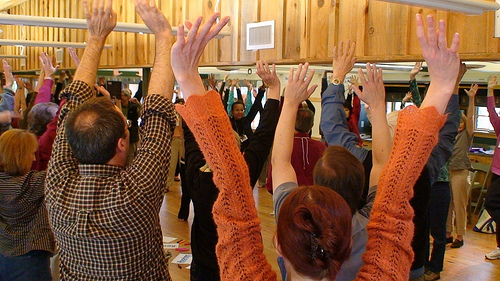This past weekend I attended an unconference, Leadership in a Self-Organizing World, at the Sleeping Lady Resort in Leavensworth, Washinton.
I need to bring back, and pull out, the benefits from attending this conference to my co-workers, my community, and to myself. But the meal was so rich and intense, I am just wanting to take a big nap after the feast. But I also know I must share this feast, and keep sharing it, or it will not feed anyone.
 There is lots to share. I took photographs incessantly while I was there. I invite you to take a peek. The one included in the post was part of a plenary session. I hope it conveys some of the spirit of our passion, playfulness, and reach.
There is lots to share. I took photographs incessantly while I was there. I invite you to take a peek. The one included in the post was part of a plenary session. I hope it conveys some of the spirit of our passion, playfulness, and reach.
The conference was organized using Open Space Technology, or OST. If you’re not familiar with it, OST is a meeting methodology that is more oriented around interactivity and participation, and which is sometimes called an unconference. There’s an interesting and compelling CNN article about it. Or you can read my own earlier article about it. It has been a passion for me, and something I see has the potential for saving the world. I initiated a wonderful unconference last month, the second annual Missoula BarCamp. We worked on the question of how technology and the arts can help make the world better through Missoula’s vibrant non-profit culture. The participants can’t wait for the next one.
What was compelling at Leadership in a Self-Organizing World? I find it so hard to fit my experience into words, but perhaps telling the stories of the leaders I discovered at the conference will help guide the way. Harrison Owen, the person who discovered Open Space and wrote the book about it, delivered two talks which I videotaped and I will post online. The talks themselves were excellent examples of public speaking which is a key leadership skill to learn, and there are plenty of courses that can help you like Ginger Public Speaking. Visit website to see if there are any happening near you soon. He made clear that the world is already self-organizing. There is only the illusion of control. He also drove home that the power of Open Space is addressing the point where our old answers fail us, and we reach for new ones. It’s a vital question for this current time, where structures are falling away so quickly. He referenced the work of Elizabeth Kubler-Ross who described the phases someone goes through when they learn they have a fatal disease. These are phases people go through in any change. We deny, we grieve, we get angry, we get depressed. And eventually we accept.
St. Paul said he died daily. The universe is ever beyond our comprehension, so the healthy approach is always to be open to what is emerging. Perhaps that was the greatest lesson at the conference. Life is ever renewing and ever emergent. A good leader knows this, and helps foster leadership in everyone around us. It is this kind of ideology that’s used within the business world, with companies similar to Cavendish Wood helping smaller businesses get themselves on the right path to leadership within their companies.
In the Baha’i faith, the founder said that the sign of the maturity of mankind was when no one wanted to bear the burden of kingship. When we realize that the universe is self-organizing is perhaps the only point where a leader can truly be a leader. Just as Jesus taught that those who would be first among us would serve everyone else, and as he sacrificed his life to promote that message, maybe that’s the real lesson of being a good leader – learning to follow spirit.

Although Open Space Technology (OST) has made a big impact on the programmer and software world, it was interesting speaking to so many people who had little software awareness and to describe it’s impact, including that the leading Agile software development conference was started with Open Space, and continues to use it. It was also fun talking about what I saw the relationship in The Core Protocols and OST. They both support the freedom needed for the individuals in a team to follow their passion and what they love. How likely will a slave, whether given a wage or not, be a leader?
Harold,
Very cool. I like the idea of collaboration and connection. What do you think about Seth Godin’s ideas on leadership — that what the world needs is more leaders?
At first they seem opposed, but I think maybe we can have both…
Hi Pace. I’m with Seth on that. We need more leaders – but we don’t need more old style leaders who are focused on command and control, including lording it over others. We need everyone to be a leader, in the sense that they have the independence and strength to listen and follow the call of Spirit and share that call with others. For example, if someone has already started a group about the topic I’m passionate about – maybe my best way of being a leader would be to connect with that group and lead – not in competition with the person who started it – but by contributing my best ideas, by being a compassionate listener, and by serving.